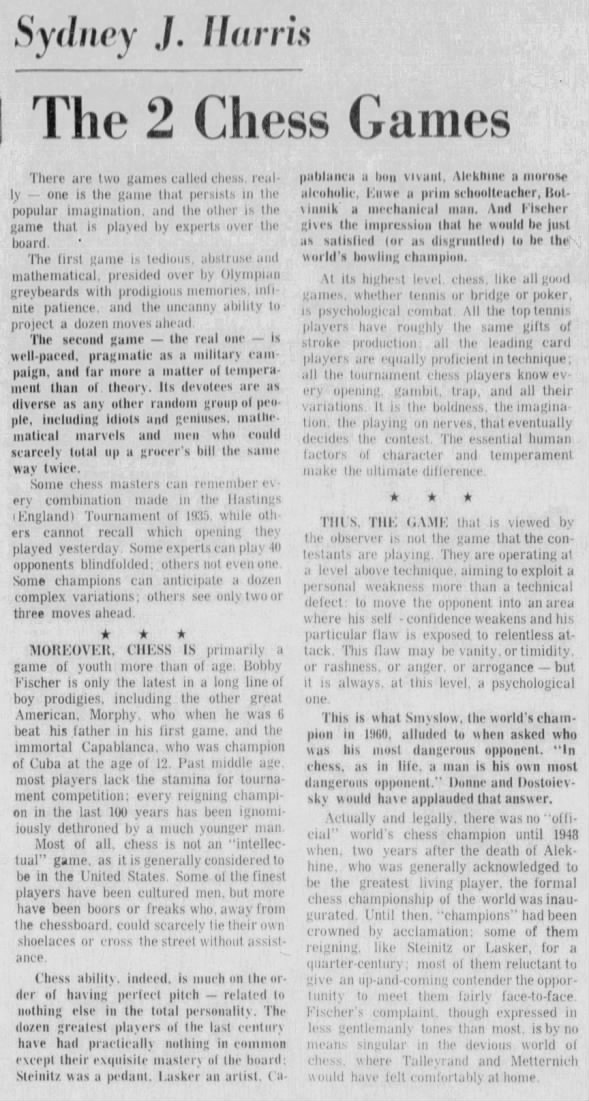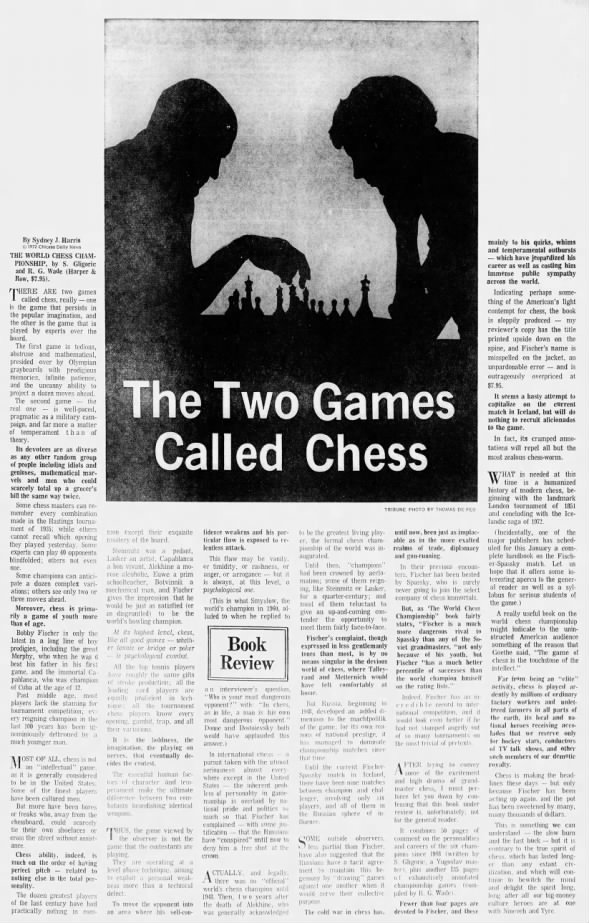The San Francisco Examiner San Francisco, California Wednesday, July 19, 1972 - Page 35
The 2 Chess Games by Sydney J. Harris
There are two games called chess really — one is the game that persists in the popular imagination, and the other is the game that is played by experts over the board.
The first game is tedious, abstruse and mathematical, presided over by Olympian graybeards with prodigious memories, infinite patience, and the uncanny ability to project a dozen moves ahead.
The second game — the real one — is well-paced, pragmatic as a military campaign, and far more a matter of temperament than of theory. Its devotees are as diverse as any other random group of people, including mathematical marvels and men who could scarcely total up a grocer's bill the same way twice.
Some chess masters can remember every combination made in the Hastings (England) Tournament of 1935, while others cannot recall which opening they played yesterday. Some experts can play 40 opponents blindfolded, others not even one. Some champions can anticipate a dozen complex variations; others see only two or three moves ahead.
MOREOVER, CHESS IS primarily a game of youth more than of age. Bobby Fischer is only the latest in a long line of boy prodigies, including the other great American, Morphy, who when he was 6 beat his father in his first game, and the immortal Capablanca, who was champion of Cuba at the age of 12. Past middle age, most players lack the stamina for tournament competition; every reigning champion in the last 100 years has been ignominiously dethroned by a much younger man.
Most of all, chess is not an “intellectual” game, as it is generally considered to be in the United States. Some of the finest players have been cultured men, but more, away from the chessboard, could scarcely tie their own shoelaces or cross the street without assistance.
Chess ability, indeed, is much on the order of having perfect pitch — related to nothing else in the total personality. The dozen greatest players of the last century have had practically nothing in common except their exquisite mastery of the board; Steinitz was a pedant, Lasker an artist, Capablanca a bon vivant, Alekhine a morose alcoholic, Euwe a prim schoolteacher, Botvinnik a mechanical man. And Fischer gives the impression that he would be just as satisfied to be the world's bowling champion.
At its highest level, chess like all good games, whether tennis or bridge or poker, is psychological combat. All the top tennis players have roughly the same gifts of stroke production; all the leading card players are equally proficient in technique; all the tournament chess players know every opening gambit, trap, and all their variations. It is the boldness, the imagination, the playing on nerves, that eventually decides the contest. The essential human factors of character and temperament make the ultimate difference.
THUS, THE GAME that is viewed by the observer is not the game that the contestants are playing. They are operating at a level above technique, aiming to exploit a personal weakness more than a technical defect to move the opponent into an area where his self-confidence weakens and his particular flaw is exposed to relentless attack. This flaw may be vanity, or timidity, or rashness, or anger, or arrogance -- but it is always, at this level,a psychological one.
This is what Smyslov, the world champion 1960, alluded to when asked who was his most dangerous opponent. “In chess, as in life, a man is his own most dangerous opponent.” Donne and Dostoievsky would have applauded that answer.
([Not emphasized by the author, however, from the time Robert Fischer reached 13 years of age till the battle over the world crown in 1972, the “other chess game” known as “Soviet Machiavellianism” was in full swing, to thwart Fischer's ambitions, every opportunity.])
Actually and legally, there was no “official” world's chess champion until 1948 when, two years after the death of Alekhine, who was generally acknowledged to be the greatest living player, the formal chess championship of the world was inaugurated. Until then, “champions” had been crowned by acclamation; some of them reigning, like Steinitz or Lasker, for a quarter-century; most of them reluctant to give an up-and-coming contender the opportunity to meet them fairly face-to-face. Fischer's complaint, is by no means singular in the devious world of chess, where Talleyrand and Metternich would have felt comfortably at home.
 The 2 Chess Games 19 Jul 1972, Wed The San Francisco Examiner (San Francisco, California) Newspapers.com
The 2 Chess Games 19 Jul 1972, Wed The San Francisco Examiner (San Francisco, California) Newspapers.com
 The Two Games Called Chess 20 Jul 1972, Thu Des Moines Tribune (Des Moines, Iowa) Newspapers.com
The Two Games Called Chess 20 Jul 1972, Thu Des Moines Tribune (Des Moines, Iowa) Newspapers.com























